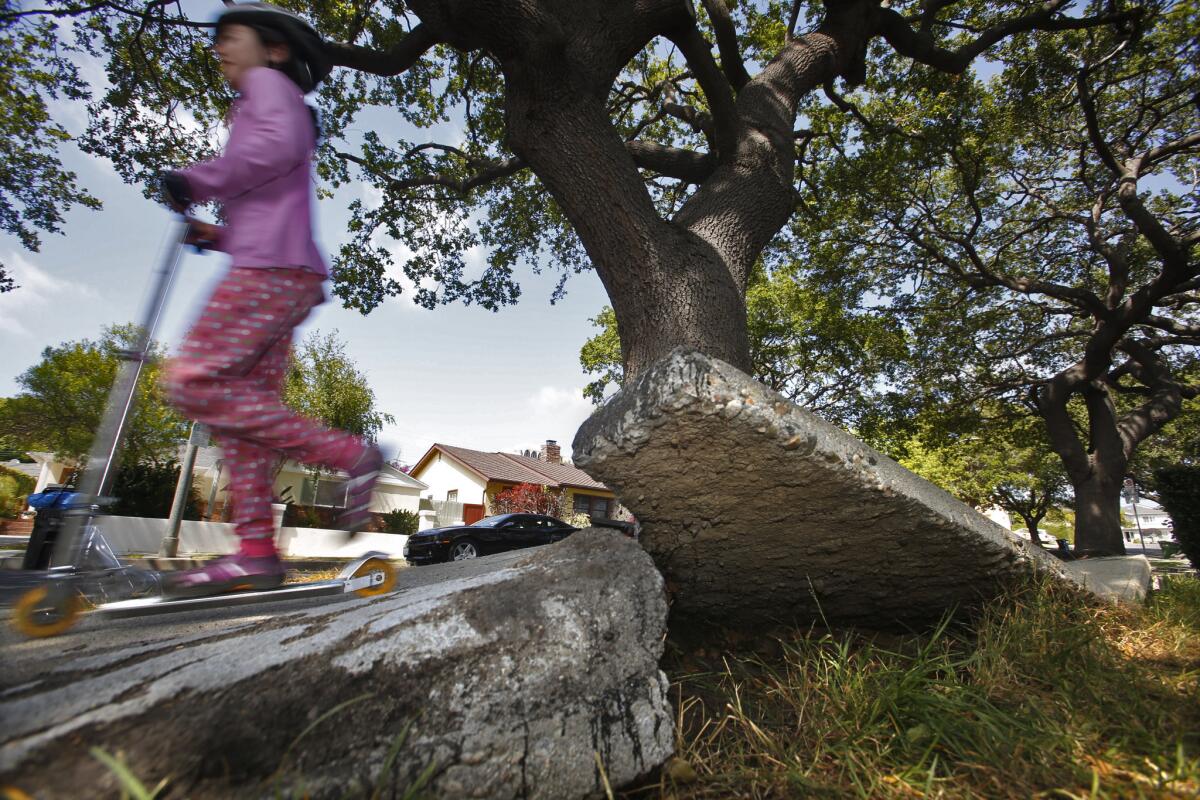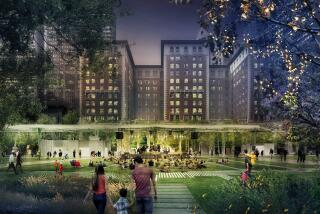L.A. plans to fix sidewalks, then hand off responsibility for future repairs

A child rides a scooter over a broken sidewalk on Saturn Street in Los Angeles in 2013.
Under a tentative plan to smooth its badly broken sidewalks, Los Angeles would spend money to fix walkways next to homes and businesses, then gradually hand off the responsibility for future repairs to property owners — a “fix and release” plan that has troubled some community groups worried about financially strapped residents.
The proposed new policy, which was backed Monday by two City Council committees, would roll back a longstanding rule that had put the city on the hook for sidewalks buckled by street trees. State law puts the burden for sidewalk repairs on the adjacent property owner, but L.A. took on responsibility for sidewalks damaged by street trees decades ago.
City officials have blamed L.A.’s rule for the sorry state of its sidewalks, which worsened as government funding failed to keep up with the needed repairs.
Join the conversation on Facebook >>
That ultimately spurred a lawsuit by advocates for the disabled, who argued that impassable walkways violated their rights to access the city.
Under a preliminary settlement in that case, Los Angeles has pledged to spend more than $1.3 billion over the next three decades to repair sidewalks. But City Administrative Officer Miguel Santana has argued that after making such fixes, Los Angeles must gradually hand off responsibility for future repairs, or risk seeing its sidewalks return to the same woebegone state that landed it in court.
That city exception “got us in this mess to begin with,” City Councilman Joe Buscaino said.
At a joint meeting of two City Council committees Monday, Buscaino and other city lawmakers backed the “fix and release” idea and hammered out other details of their new plan to fix sidewalks.
Under the proposed policy, Los Angeles would first pay to repair sidewalks next to commercial, industrial and residential properties, regardless of whether the damage was caused by a city tree.
The city would establish a cap, yet to be determined, for the amount it would shell out for sidewalk repairs on each parcel.
City Councilman Paul Krekorian said the cap would prevent city funding from being “monopolized” by a few especially expensive or vast projects, and would not affect the average homeowner facing sidewalk repairs.
Under the plan, L.A. would also offer property owners a rebate if they opted to repair broken sidewalks before the city does so, reimbursing them for roughly half of the average cost per square foot of repairs if they make fixes during the first three years of the new program.
The city would also waive permit fees for people fixing sidewalks next to their property. Lawmakers said those incentives would stretch city funds and allow people who are eager to get their sidewalks repaired earlier to do so.
City officials also stressed that after a sidewalk gets repaired, there would be a warranty period to protect property owners from immediate problems. That warranty period would last 20 years for residential properties and five years for commercial and industrial ones.
During the warranty period, the city would guarantee one repair before transferring the financial responsibility for any future fixes to the property owner. It would not apply to damages caused by negligence “on the part of any party except for the city,” according to a letter written by several council members outlining the plan.
Members of the Alliance of Californians for Community Empowerment, a community organizing group, said that many residents were still concerned that homeowners would have to bear the costs of sidewalk repairs once that warranty expired.
Alliance member Simone Newman, who said she lived in the Crenshaw area, said that though homeowners continue to pay taxes, “it seems that every year we get less and less for that same dollar.”
“Now that they’ve been sued, they’re trying to put it back on us — when they aren’t doing what they were supposed to do with our tax dollars in the first place,” Newman said.
At Monday’s hearing, City Councilman Mike Bonin questioned whether the city was doing enough to trim trees and prevent them from buckling sidewalks in the decades to come. City staffers said at the hearing that street trees should be trimmed every five to seven years, but are currently trimmed roughly every 18 years.
Bonin said he wanted to make sure “we’re not absolving ourselves from responsibility and then causing a problem that someone else, the resident, has to pay for 20 years down the road.”
Krekorian said he believed that the city had already taken steps to avoid such future problems by planting different kinds of trees and using better planting methods. “The future problem of trees is going to be largely eliminated” by those changes, Krekorian said.
The “fix and release” idea had also drawn opposition from pedestrian and transportation advocates, who have argued that the city should fund its sidewalks just as it does roads. However, one of those advocates said Monday that she was nonetheless happy to see the planned policy move forward to begin repairing L.A.’s broken walkways.
“We think it’s a step in the right direction and we’re anxious to see it get underway,” said Jessica Meaney, managing director of the nonprofit transportation advocacy group Investing in Place.
The proposed policy now heads to the full City Council. If approved, city lawmakers say the new program for sidewalk repairs could begin in the next budget year, which starts in July.
Follow @latimesemily for what’s happening at Los Angeles City Hall
ALSO
Developer should lose building permits over illegally chopped trees, L.A. officials say
Lawsuit says L.A. endangered homeless people by seizing their tents and shopping carts
More to Read
Start your day right
Sign up for Essential California for news, features and recommendations from the L.A. Times and beyond in your inbox six days a week.
You may occasionally receive promotional content from the Los Angeles Times.







